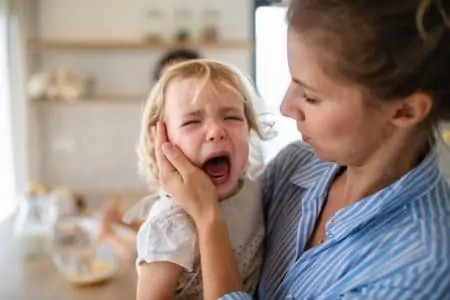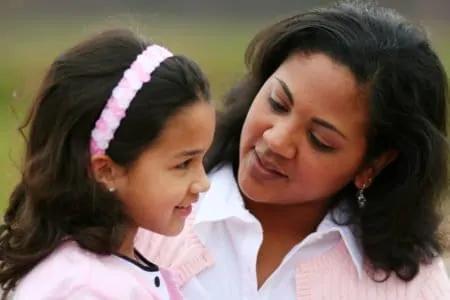Respect can mean different things depending upon whom you ask, but most of us can agree it’s an important concept to teach to our children. We want to help our children grow into respectful adults, and we also want our children to know they should expect to be respected themselves.
If you’re wondering how to teach respect to kids, we’ll give you a crash course. Learn what it is, how to explain it to your child, why a kid might be disrespectful, and what to do about it when they are.
Key Takeaways
- Respect means treating others how you’d like to be treated and acknowledging their thoughts and opinions.
- Children may be disrespectful due to anger, copying behavior from others, or struggling with new situations.
- To teach respect, be a role model, define respectful words and behaviors, and explain how respect feels.
- When a child is disrespectful, stay calm, consider the severity, and provide consistent consequences.
What Is Respect?
Respect is not just a way of thinking about other people; it is also about how we treat other people — how we act toward them.
Respect means treating other people the way you would like to be treated, and acknowledging the thoughts and opinions of others. It also means behaving in a polite manner, but how do we explain that in terms our children will understand?
How to Explain Respect to Kids
Respect is a complex concept for a child to grasp, so you will have to use words and examples they can understand.
Begin by saying that respect can be a feeling — you can feel respect for another person. Then, you can say that, when you feel respect for someone, you want to be polite and kind toward that person. Finally, tell them that, to show respect, you should treat people how you would like to be treated yourself.
You can then explain that your words and actions can show respect or a lack of it. Explain to your child, when a person is disrespected, it can make them feel bad. Depending upon their age, you can ask them to think about a time they were treated badly, and how it made them feel.
However, respect is an abstract concept, and your child may struggle to truly understand it. In this case, you can provide them with some simple, age-appropriate examples of respect.
You can tell your child that, when you show someone respect, you:
- Don’t yell, or talk loudly over someone else who is talking.
- Listen to another person’s point of view.
- Follow the rules to show you care about the person who set them.
The American Academy of Pediatrics has compiled a list of books for children of all ages to help parents teach kindness and respect (1).
Why Children May Be Disrespectful
There are many reasons why your child may be disrespectful. Sometimes it may be accidental, while at other times, it can be deliberate.
Your Child Is Feeling Angry Or Overwhelmed
A high percentage of disrespectful behavior and language emerges when a child is angry or overwhelmed by other emotions. Their feelings “push out” their conscious behavior, and they can say or do things in the heat of the moment.
These instances are usually short term, and are not indicative of a general change in behavior.
Your Child Isn’t Thinking
Sometimes your child may be distracted or deeply engrossed in a particular activity, and inadvertently behaves in a disrespectful way. This doesn’t mean your child is intending to be disrespectful, or that they have forgotten the positive lessons you have taught them. Rather, it indicates your child may be having difficulty splitting their attention.
In these situations, I recommend that parents have the child stop their activity, make eye contact, and then engage in communication again.
Editor's Note:
Dr. Leah Alexander, MD, FAAPSometimes, being respectful needs focus. The younger your child, the more likely it is that their disrespect is unintentional.
Your Child Is Copying You
On some occasions, your child is disrespectful in a situation because they are emulating your behavior. If your child is displaying a lack of respect for a person, or for someone’s thoughts and feelings, consider whether you do the same thing (2).
This is especially true if you have a tendency to speak over your child when they are trying to express themselves, or if you discount your child’s emotions without giving them any consideration.
Your Child Is Copying Other People
As our children grow, the behavior of their peers begins to influence how they behave. Your child’s disrespect may be a result of spending time with friends whose families have different standards.
This possibility is not restricted to friends. Sometimes your child can be influenced by visiting relatives who feel differently about respect. Many families find their child displays disrespectful behavior to others after staying with older relatives who may have different policies regarding language and behavior.
These new influences in their life might not be real people either. They may be imitating negative behavior they see on a cartoon or favorite television show (3).
Your Child Is In A New Situation
You may teach your child that everyone should be treated with respect, but your child can forget these lessons when they are in a new situation.
Your Child Is Going Through A Significant Life Change
It is not unusual for parents to notice a general change in their child’s behavior when they are going through a significant change. Perhaps your child has started going to daycare or kindergarten, or maybe you have moved to a new home. While you might see these life changes as something positive, your child might be struggling to cope.
Also, a child going through a negative life change, such as the loss of a grandparent or other much-loved family member, may be disrespectful at times (4). This is not an indication they have changed — it is more of a case of your child struggling to cope.
How to Teach Respect to Kids
Teaching your child about respectful words and behaviors requires a two-pronged approach: You have to explain the concept of respect, as well as teaching your child how to apply the concept to their words and actions.
So, if you have explained what respect is, don’t expect your child to be able to apply that concept to day-to-day situations without support and direction. Here is what you can do to keep them on track (5).
Be A Role Model
When teaching any type of behavior, the most important thing is to be a role model for your child.
Much of how we learn to behave is subconscious. We see other people behaving in a particular way, and we do the same. If you want respectful children, you need to be a respectful adult.
Define Respectful Words And Behaviors
Explain to your child which words and actions show respect and which ones do not. However, don’t overwhelm your child by giving them a list of things they must and must not say and do.
Instead, teach them as you go by gently correcting disrespect and providing a correct alternative.
Explain How Respect Feels
Using age-appropriate language, explain to your child how respect and disrespect make a person feel (6). Then, ask your child how they would like to make other people feel. Give them plenty of simple examples.
Show Them How
The younger your child is, the more difficult they will find it to understand respect as an abstract concept that can be applied to multiple situations. So, instead of telling your preschooler to be respectful to their teacher at daycare, give them concrete examples.
You can say to your child:
If your teacher is talking to another child, and you would like to speak, wait for the other person to finish.
Then follow-up with:
If you were talking, and someone else came up and talked over you, how would it make you feel? Would you feel sad? Being respectful is about thinking of other people, and acting how you would like them to act.
Ask Them Questions
If you see someone acting disrespectfully, ask your child whether they think that person was being respectful or disrespectful. Then, ask your child how they think the other person felt, and how things could have been handled more respectfully.
Discipline Disrespect
If your child is disrespectful, tell them that their behavior is not okay. Explain to them what they have done, and how it was disrespectful. Discuss how that disrespect made you feel, and how they would feel if the roles were reversed.
Depending on how serious the incident was, you may want to provide a warning, or it might be appropriate to apply a suitable punishment.
Teach Them To Expect Respect
It is also important to teach your child that they should expect to be treated with respect by others (7).
You could say:
I saw you that let your friend have the toy you both wanted. That was very kind. I know you were thinking of how they were feeling.
How did it make you feel when you gave them the toy? Did you feel happy to do it, or did you feel sad, like you had to give them the toy?
I know we ask you to respect other people’s feelings. That’s what you were doing, and that’s good.
But, you also have to think about how you feel. If your friend made you sad by making you give them the toy, they were not being respectful to you. How could we do it differently the next time, so you are both respectful?
You can then give your child an alternative solution to apply in the future. You can say:
It is okay to say to your friend, “I know you would like a turn. Right now, it is my turn, and I will give you the toy after.” That way, you are respecting your friend’s feelings, and not making yourself sad.
What to Do When Your Child Is Disrespectful
When your child is disrespectful, it is easy to react instinctively, but try your best not to do that. The best results always come from a calm, measured approach and not a knee-jerk reaction (8).
Be Prepared
Don’t wait until your child is disrespectful to decide how to react. In these situations, emotions are often high, and that is not the best time to formulate your response. Instead, look at the following hints and tips now, and you will be able to cope more appropriately when the time comes.
Don’t Take It Personally
When your child is disrespectful, the first thing to remember is not to take it personally (9). By being disrespectful, your child is not reacting to you as a person, but to the situation they find themselves in.
Try to separate the words and behaviors from you and your child. This will allow you to look at the situation more objectively.
Consider If They Know What Is Appropriate
The younger your child is, the more difficulty they will have applying a concept to all situations. If you tell your child they must say please and thank you to Grandma, they may not be emotionally mature enough to apply that to Grandpa or other relatives.
If this is the case, be sure to keep teaching and modeling the correct behavior, and explain that it can apply in many situations.
Ask Yourself: How Bad Is It?
If your child makes a brief, passing comment that you find to be rude, ask yourself, “Is this worth correcting, and if so, how do I correct it?”
Sometimes disrespect can be unintentional and minor. In that case, either a simple comment at the time, or a discussion about it later can be the best way to respond. For more significant disrespectful behavior, you may have to remove your child, calmly, from the situation, and deal with it right away.
Consider A Warning
Sometimes, a warning may be the best way to deal with disrespectful behavior. A simple comment about how you feel they are being disrespectful may suffice. You can also say you expect them to behave with more respect to get them back on track.
Discipline, Don’t Punish
Initially, instead of applying negative consequences to your child’s disrespectful words and deeds, offer them the opportunity to earn privileges.
We’re not talking about paying your child to act well. But instead of saying, “If you refuse to put your toys away, we are not going to the park,” frame it differently.
Try saying, “We will only go to the park when you have put your toys away. If you wait too long to do it, then we will not have time to go to the park.”
This may seem like a small distinction, but by avoiding an adversarial situation, you will be modeling the correct, respectful behavior. And, you will minimize the possibility of getting into a power struggle.
Provide Consequences
If the words or behavior are significant, or you have provided a warning which is then ignored, you may have to demonstrate to your child that there is a negative consequence to their action (10).
For younger children, this can be a time-out or another similar, age-appropriate consequence. For older children, it should be proportionate to their transgression, how frequently it has happened, and whether they have heeded any warnings.
It may be appropriate to tell your child they can no longer go out to play, or your older child that they are grounded.
Be Consistent
As with all areas of parenting, try to remain consistent in your expectations, your rules, and the potential consequences of disrespectful behavior.
By using these hints and tips, you can help your child be more respectful, avoid unnecessary confrontation, and remain calm in the face of adversity.
Be The Respect
Teaching respect to your kids is all about providing them with a role model, explaining your expectations, being consistent, and following through with fair, measured consequences.
It can seem hard at times, but, once the groundwork is laid, it gets much easier.





